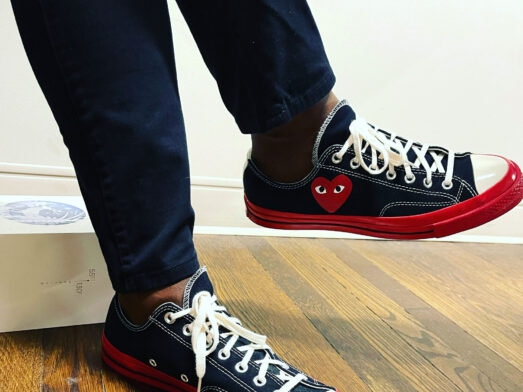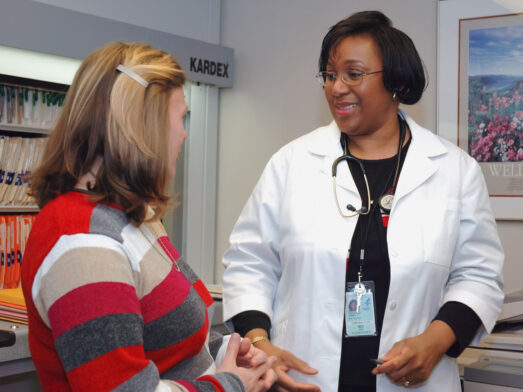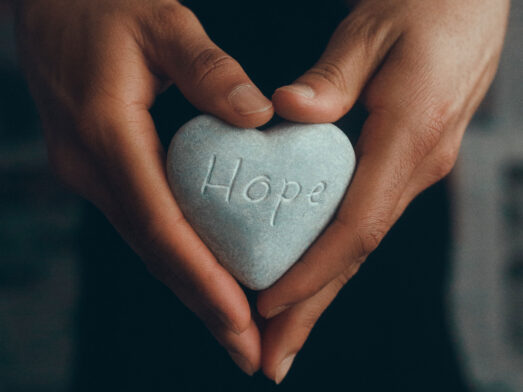SHOWING UP
“It’s a good place when all you have is hope and not expectations.”
SHOWING UP
It’s a good place when you have hope, not expectations.
The thing that has been most surprising to me is the way people react to my diagnosis. I discovered that well-intentioned people often don’t know what to say or, for that matter, what to do. For most of us, our instincts are to show empathy, love, support and “be there.” What I realized, and had to eventually accept, is that everyone has their own form of expression. However, they may not have the emotional language or communicative skills to express their empathy or concern.
Someone I feel very close to – a 30+ year friend – hurt me deeply, not consciously, because of their inability to “show up” for me…in the way I expected. It took me a minute to realize that it was neither intentional nor malicious.
This individual was able to “lean in” and “show up” when I first shared the diagnosis with words of encouragement. Then, without warning or explanation, they ghosted me. They stopped “showing up.” When confronted, the person told me that they couldn't deal with it and didn't know the right words to say. I appreciated the acknowledgement, but had difficulty accepting their excuses.
Being an adult means having to do things that are unpleasant and uncomfortable. It’s part of life. It is about looking outside of one’s self and changing the focus to the individual in need.
Regardless of the ailment or condition, I believe not “showing up” is probably the most impactful and unkind thing one can do…especially when someone they care about is going through a crisis.
Initially, I thought I was angry. But an oncology therapist and cancer survivor, Cathy Nobil-Dutton, helped me see that instead of anger, I was deeply hurt by those people close to me, who, regardless of the reason, decided not to “show up.”
I now fully understand that another individual’s cancer diagnosis or health crisis is not about you. While my commentary is specific to pancreatic cancer, it applies to any crisis one might be going through. It is about the individual – their journey and the battles they have to face. Every aspect of the journey is a battle. This makes consistency in care, “showing up” and being supportive all the more important…and necessary. There are no rules and no guidebooks instructing how to “show up.”
We have to listen to our heart’s voice – “Just be there!” How simple to say, how difficult to do.
For example, one can simply send an email, a note, a text or call, to share that their thoughts are with the cancer patient…and their often-overlooked caregiver. (More about the importance of the caregiver and the role they play later.)
Kind simple gestures always cheered me; it was comforting to know that people cared. And for everyone who didn’t show up, there were those who, to my surprise, showed up in amazing ways. A work colleague of my husband, whom I have never met, sent a beautiful blanket that arrived just before my scheduled surgery. What a kind thoughtful and meaningful gesture. Others “hit the right notes,” scheduling “drive-by visits,” sending foods that I like, books, articles, candles, music. Such gestures required little more than a willingness to show compassion and empathy. Illness can strain relationships, but a simple gesture demonstrates compassion and care. It helps maintain the fragile bond of friendship. This is what “showing up” looks like from my perspective, the cancer patient who is struggling to survive.
A distant cousin (“Stephen,” who I am not very close to) was told about my diagnosis by his mom, my favorite aunt. She waited five months to tell him because as she said, “Well, you know Stephen and, to be honest, I’m not sure how he will react.” I thought to myself but didn’t say “React to what? My cancer!?” But she’s right, I do know Stephen.
Two weeks later my aunt called me early on a Friday morning in what sounded more like a panicked warning than her usual ‘checking on you’ concerned tone.
She said, “I told Stephen about your cancer and he took it very well. He said he was going to call you.”
One week later, my phone rang at 10 o’clock on a Saturday night. The Caller ID showed that it was Stephen. The conversation went like this…
Stephen:
“Hey cuz. How you doin’? Mom told me about your situation. It sucks – you know, goin’ through that thing you goin’ through.”
Eric:
“It does suck, and it’s been a lot of ups, downs…and surprises – like a rollercoaster. It has also proven to me that I am a lot stronger than I knew…And blessed to have love and support of a small circle of family and friends.”
Stephen:
”Yeah, I hear all that, but you know, if you need anything, I’m here for you too. I got a nice car and can take you to your appointments, shopping, whatever you need. I’ll take you where you need to go.”
Eric:
“Thanks, Stephen. I really appreciate that, but all of those bases have been covered by my husband.”
Stephen:
“Yeah, well I’m your cousin. We [are] family…blood, so I can help you if I want. Just tell me what you need and I got you.”
Eric:
“Stephen, I really appreciate your concern and the offer, but we’ve been going through this for seven-months now with treatments, a very serious surgery and a lot of lifestyle changes. By now, we have a routine that works.”
Stephen:
“Yeah, I get all that, but I can fit you in. Let me know.”
Eric:
“That is great Stephen. I can’t tell you how much it means, but, honestly, I’m good. I’m blessed, my husband is holding it all together, but thank you again very much for the offer.”
Stephen:
“Well fuck you then, nigger!”
Click
And that was the last time I heard from or spoke to my cousin, Stephen. I suppose he thought he was “showing up” for me!
The difficulty with expectations
Showing up for a cancer patient is a tangible way to express your love, care, and solidarity. It provides emotional, practical, and psychological benefits that contribute to the patient's well-being and overall quality of life during an extremely challenging time.
Having expectations is a natural part of being human. However, there are situations and contexts where having no or lower expectations can be beneficial. Here are some reasons why I chose to minimize or try to have no expectations:
1) Reducing Disappointment: High expectations lead to disappointment if reality doesn't match what is anticipated. Lowering expectations helps mitigate the emotional impact of unrealized hopes.
2) Openness to Surprises: When I had no or fewer expectations, I became more open to whatever outcomes arose. In my experience, this led to a greater sense of wonder, spontaneity, and the ability to appreciate unexpected positive developments.
3) Less Stress and Pressure: Having high expectations creates stress and pressure to meet those standards. Lowering expectations leads to a more relaxed and flexible approach to situations.
4) Fostering Acceptance: When I didn’t have rigid expectations, I became more likely to accept situations as they are. This led to greater peace of mind and fortified my emotional resilience.
5) Improved Relationships: Expecting too much from others strains relationships, especially if those expectations are unrealistic. Having more realistic expectations leads to healthier interactions and fewer conflicts.
6) Enhanced Adaptability: Lower expectations allowed me to adapt more readily to changing circumstances.
7) Small Victories: Without grand expectations, I was able to notice and appreciate the smaller positive aspects of a situation or outcome.
8) Minimizing Attachment: High expectations lead to attachment to specific outcomes. Lowering expectations helped me detach from results and focus more on the process and the present moment.
9) Encouraging Gratitude: When we don't take outcomes for granted, we're more likely to feel grateful for what we do have or achieve. A sense of gratitude can be healing.
10) Promoting Self-Compassion: Lower expectations can prevent the tendency to be overly critical when goals aren't met, fostering self-compassion and self-acceptance.
Completely eliminating expectations in life is not realistic. It's more about striking a balance, being mindful of our expectations, recognizing when they might be causing more harm than good, and finding a healthy middle ground.
Managing expectations, setting realistic goals, and practicing open-mindedness leads to a healthier more balanced approach to life's uncertainties. Lesson in point: When my dear “cuz” called me, thank goodness I had no expectations.
Written By
Eric Roberts







